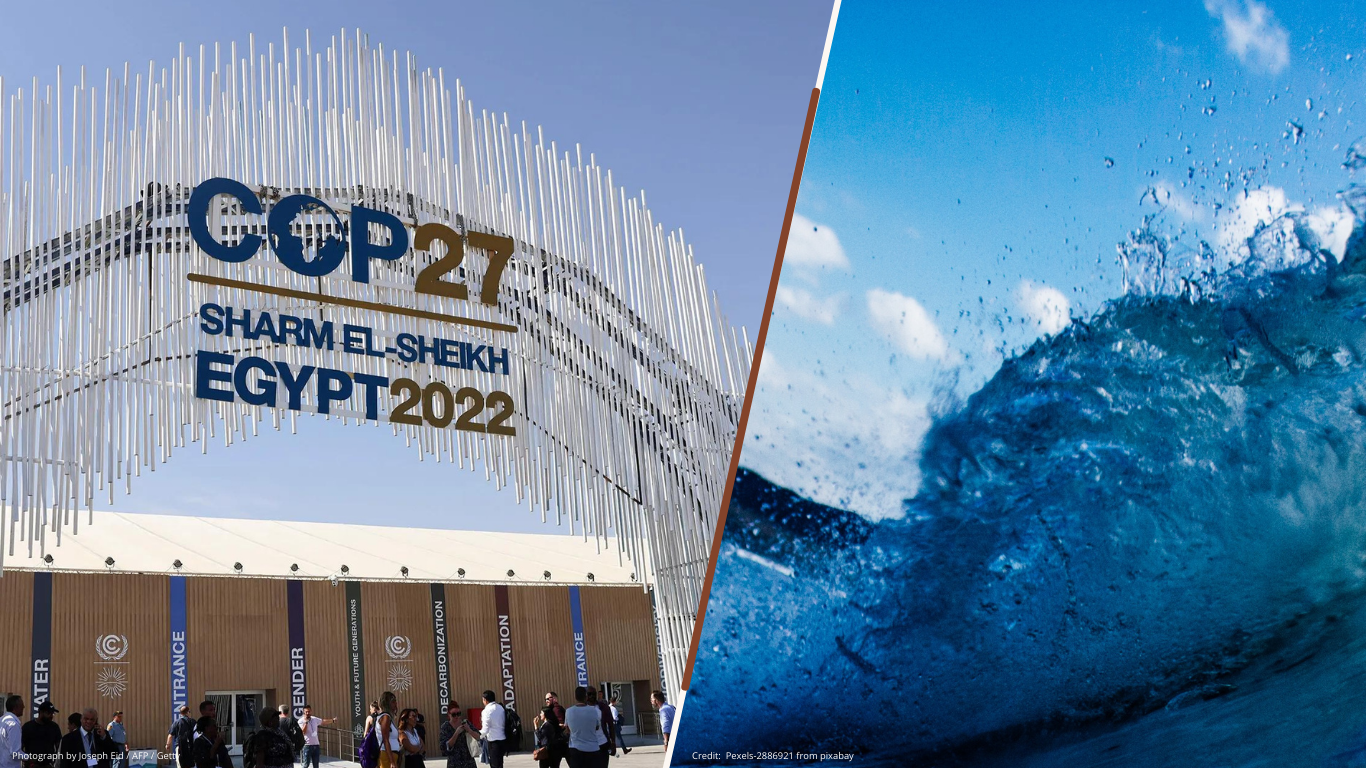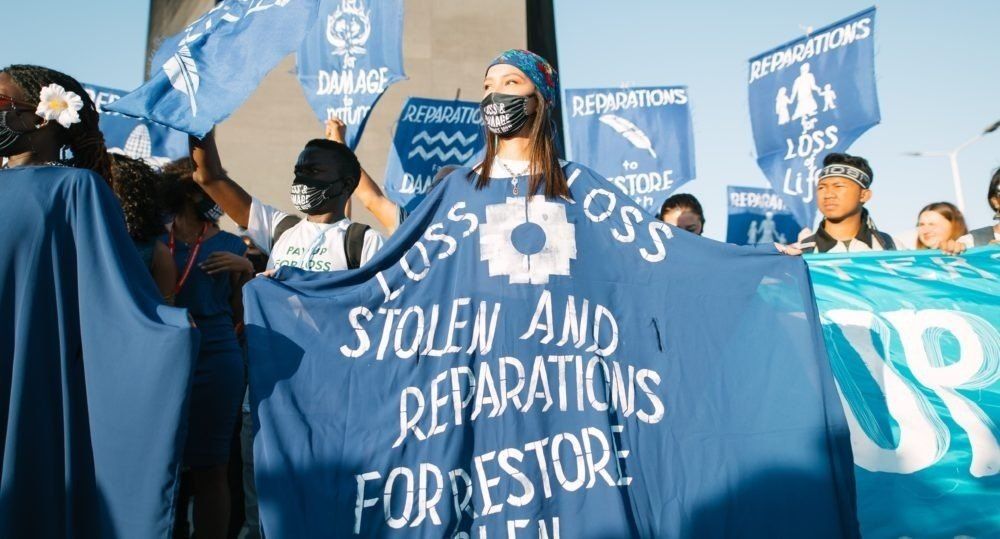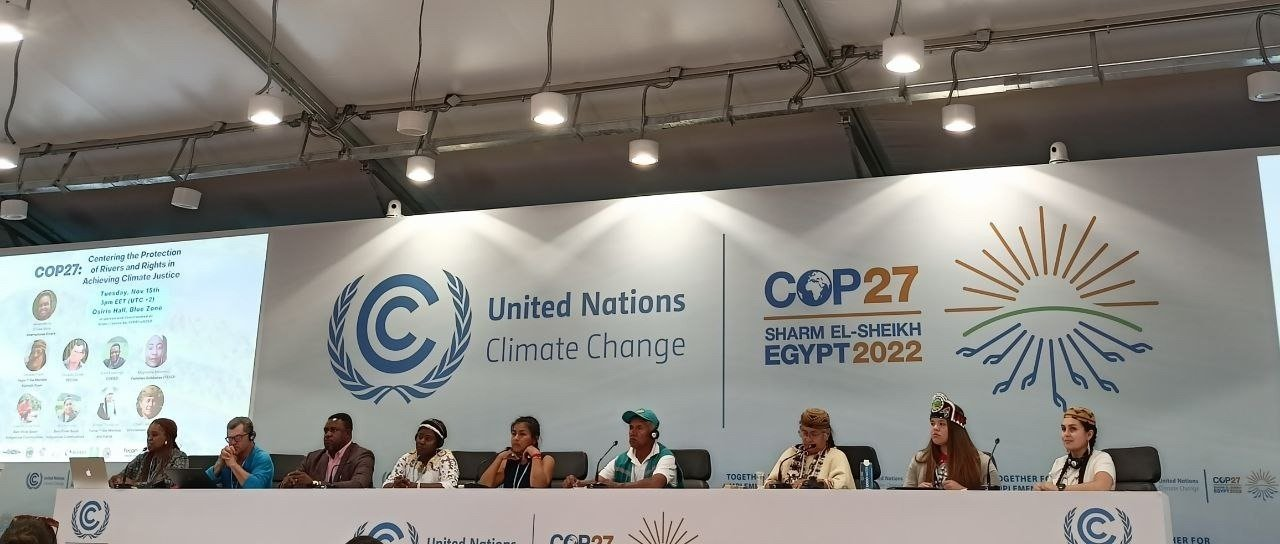The flood is coming: Water security issues at COP27
Credit: Photograph by Joseph Eid / AFP / Getty & Pexels-2886921 from pixabay

21 November 2022, Sharm el-Sheikh (Egypt) - Although water is not included in the architecture of the Paris Agreement, it's a key topic in the climate agenda as more and more countries and regions are facing the negative consequences of climate change related to water resources. The water crisis is global: droughts, floods, and lack of fresh and clean water are among the negative effects caused by the imbalance of the climate system, already leading to huge infrastructural, financial, and social losses and issues.
Therefore, COP27 paid much attention to water security, such as sustainable access to clean water to maintain human health, well-being and socio-economic development, protection from water-borne pollution and water-related disasters. There was a Water Pavilion and Ocean Pavilion at the COP venue, and November 14th was declared Water Day as the daily theme of the Conference. But how do these formal acts of attracting attention lead to results and to help solving problems related to water security?
Loss and damage
For the first time in 30 years of UN climate negotiations, thanks to persistent demands from vulnerable countries and the civil society, the discussion on loss and damage took center stage at COP27, and negotiations were focused on agreeing on the creation of a financing mechanism. As a result, they reached a milestone agreement and a Loss and Damage Fund was established for vulnerable countries.
Civil society activists have been constantly drawing attention to the consequences of climate change and the need for urgent assistance to those who suffer the most from them. On 11 November, a civil society actions --
#FloodTheCop - directly symbolized the floods that many regions are facing. 7 women wearing blue dresses with the slogans “The flood is coming” and “Pay now” carried a simple and understandable message: the G7 and other rich nations have a moral and legal responsibility to tax and wind-down fossil fuel companies based in their territories, and to redirect those finances to people in countries who are suffering the most losses and damages due to climate change.

Credit: Bianka Csenki (Artivist Network), Instagram @8iank4 (@artivistnet)
Water in the 6th IPCC Assessment Report
Not only the countries of the global south are facing water issues. Water safety is relevant for everyone and the evidence for this is given in the 6th IPCC Assessment Report. During the side the event “IPCC AR6 water security conclusions & launch of the Expanded Water Tracker for National Climate Plans" held on 12 November, Richard Betts, from the University of Exeter and the Met Office and a Lead Author on the IPCC Water chapter, presented the conclusions of the chapter 4 of the report:
- 4 billion people experience severe water scarcity for at least one month per year;
- The total mass of ice is decreasing in all glacial areas;
- Hundreds of millions of people face changing precipitation patterns: 163 million people face drier conditions, 498 million face wetter conditions.
- Cases of heavy precipitation are increasing all over the world, which leads to floods
- Changes in river flows are also observed in many regions (for example, a reduction in hydro energy generation in Northeastern Brazil caused by a 30% reduction in the flow in Sobradinho Dam)
- The number of droughts is increasing in many regions. And extreme droughts are projected to become more likely with increasing climate change in many regions.
From global changes to real local consequences
Examples of frightening trends are happening all over the world today and directly affect the health and well-being of people, as well as the economic stability of countries. For example, droughts lead to huge damage on food safety. The drought in May-June 2019 in the southwestern of China led to the drying up of more than 100 rivers, and more than 640,100 hectares of crops were destroyed. Direct economic losses amounted to 2.8 billion yuan ($400 million).
This proves that until now
we cannot predict the local consequences of climate change and its risks. There is a huge gap between scientific data on the global situation and the local adaptation measures of cities, regions and countries.
Rosalind Conforth, from the Walker Institute, shared the approach of the
My Climate Risk initiative, which aims to develop and implement a bottom-up approach to regional climate risks. It helps to narrow the gap between massive climate models and apply locally the decision-making practices.
AWARe: Action on Water, Adaptation and Resilience
The new initiative for Water Adaptation and Resilience (AWARe) has been presented at COP27, reflecting the importance of water as both a key climate change problem and a potential solution. The AWARe initiative, which was drafted by the COP27 Presidency with the support of the World Meteorological Organization (WMO), was launched on the Water Day held on 14 November. It is a collective effort, with inputs from many stakeholders and UN agencies.
The AWARe initiative has three main aims:
- Decrease water losses worldwide and improve water supply;
- Propose and support implementing mutually agreed policy and methods for cooperative water-related adaptation action and its co-benefits;
- Promote cooperation and interlinkages between water and climate action in order to achieve Agenda 2030, in particular SDG 6.
It seeks to support promotion of sustainable waste-water management, sanitation policies and strategies, and water-wise energy pathways besides working on improving early warning systems for extreme weather events. It will also work towards linking water resources policies with national climate action to reflect climate change long-term impacts on water resources and demand, and to support preparedness and adaptation measures.
As stated by Dr Elena Manaenkova, WMO Deputy Secretary-General: “[...] WMO supports AWARe as an initiative complementary to the Early Warning for All and the Water and Climate Coalition. AWARe can be a practical vehicle to implement
Early Warnings for All, and the
Water and Climate Leaders Call to improve water data and information for a climate ready world”.
Consideration of water issues in national climate plans
Another “bottom-up'' approach tool for developing practical measures is the Water Tracker. It helps countries to independently assess and improve water security through the Nationally Determined Contributions (NDCs) and National Adaptation Plans (NAPs). They usually ignore the strategic role of water in solving climate problems, although water is necessary both for efforts to reduce carbon dioxide emissions and for adaptation to climate change.
The tool should also help with the distribution of funding among the most vulnerable countries. Dr Amgad Elmadi from the
Green Climate Fund (a fund established under the UNFCCC as an operational body of the Financial Mechanism to assist developing countries in adaptation and mitigation to counter climate change) believes that the Water Tracker can affect the quality of climate finance and play a big role in its distribution.
Today, 10 countries around the world are already involved in the Water Tracker project: Costa Rica, Egypt, Malawi, Somalia, Uganda, Rwanda, Nepal, Palestine, Panama and Uruguay. Ms Nicole Franciso,from the Ministry of the Environment of Panama, said that they are already using this tool to understand how their NDCs will lead to their planned goals. Panama has not yet developed a National Adaptation Plan and claims that with the experience of using the Water Tracker, the development will definitely become more successful. Already now they have realized that data and indicators on water should be included in different sectors of the NDCs, including the energy sector.
Hydropower continues to be the main focus of interest
Rivers play a vital role in carbon sinks and increasing resilience to climate change, but hydroelectric power plants (HPPs) do not allow rivers to perform these essential functions. Despite the proven harm, large-scale hydropower is still considered by some decision-makers as an effective and just solution that helps reduce the greenhouse gas emissions (GHG). At the same time,
dams and reservoirs can be a major source of methane: in the case of flooding of areas with rich vegetation (which happens extremely often), the rotting of the biomass trapped under water begins. The larger the water surface formed is, as a result of flooding, the greater methane emissions are released.

Credit: Elizaveta Merinova, Friends of the Baltic, Friends of the Earth Russia
Ahead COP26 in Glasgow, 300 organizations from 69 countries issued the Global Declaration "Rivers for Climate", calling on governments and leaders participating in the UN climate negotiations to protect river ecosystems and stop using scarce climate funds to finance false climate solutions such as hydropower. At COP27, the organizations that signed the declaration, as part of the “Centering the protection of Rivers and rights in Achieving Climate Justice” event, spoke about ongoing projects in the field of large hydropower and shared cases of destruction of local ecosystems by HEPPs. Indigenous peoples are being displaced from the territories where their ancestors have lived for many centuries, biodiversity is declining, and flora and fauna are being lost. One of these projects is the Grand Inga, the world's largest hydropower scheme on the Congo River, in Africa. Erick Kassongo, Director of Centre Congolais pour le Développement Durable (CODED), who is working against this project, was right on point saying: “A clean energy source cannot harm the environment and the indigenous peoples of the territory!".
In conclusion
It is difficult to say unequivocally how much the world community is moving forward in solving problems related to water resources and water related disasters. On the one hand, the struggle continues dealing with the consequences of the problem and not with the cause, the promotion of false solutions (such as large hydroelectric power plants), the infringement of indigenous peoples, the degradation of aquatic and terrestrial ecosystems. On the other hand, there is progress in identifying tools and measures that will lead to ensuring water security. The key components are the analysis and study of the consequences of climate change related to water; improvement of water management; conservation of aquatic ecosystems, including measures to reduce anthropogenic impacts on the climate and on the purity of natural waters. The most important thing is that these measures must lead to a fair solution to problems and be primarily aimed at supporting people and their communities who suffer most from water problems.
The
COP27´s final decision is definitely a step forward for the vulnerable countries with the establishment of the Loss and Damage Fund. It also further acknowledges the role of ocean and “the critical role of protecting, conserving and restoring water systems and water-related ecosystems in delivering climate adaptation benefits and co-benefits, while ensuring social and environmental safeguards”, but it's still not enough for other actions needed to keep the 1.5C goal and fight the global climate crisis.
***
Article written by Elizaveta Merinova and Anna Ushakova, Friends of the Baltic, Friends of the Earth Russia

